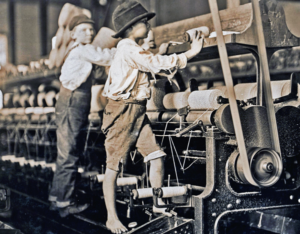Job Dependence, or Independence?
By — — Posted in Future of Work
How Do Coming Changes Impact YOU?
What kinds of changes in the work place, our culture and our world, do you anticipate, and feel are coming, and, worth supporting?
Of course we can’t fully choose which changes will emerge, though we CAN choose to participate.
That’s the very foundation to the forming our country: for the people, by the people. Democracy is by definition, participatory. I’m writing this around the 4th of July, our Independence Day and it really got me thinking.
Will you, will many of us, become more job DEPENDENT, or, INDEPENDENT in the wake of these national, and world-wide, changes to the economy, many industries, and workforce?
What’s YOUR part, and how are you impacted, in this workplace and world-wide ‘age of change’?
What happens when we’re SO dependent on our jobs, for our full time income, for our health benefits, and something like happened to way too many Americans, a 100% unexpected world wide pandemic (or some other unforeseen radical change) suddenly shifts it all, and takes some or all of these vital supports we count on away from us?
Where do we go from here? What now?
First, let’s look at our history. What it’s like on the job in the United States has changed a lot since we first became the United States. A move from manual labor and industrialism, with few worker protections and long hours then shifted to more intellectual work and the technical skills of the Information Age, and with it, hard won protections and benefits for employees.


Now we shift towards, what kind of world?
Autonomy? Independence?
I think many companies and organizations, even educational institutions are shifting in this direction:
The growing increase in remote work opportunities. Many employers are seeing multiple benefits to work from home staff, even before Covid-19 made this a necessity, including that autonomy appeals to many workers who perform better outside the confines of an office and the distractions, and even free from a set schedule when possible.
Classes, trainings, meetings can all be done online, in real time, or, by your own schedule. Zoom is now a household, not just a workplace, staple.
Whatever makes us more productive, and profitable, is always a priority to any organization. Numerous studies show, that giving employees a little more freedom, to be out of the office, and also, to simply work LESS, also somewhat counter-intuitively, perhaps, actually helps efficiency, and, cuts costs.
Less work = more production. Yes, really!
Read more about the proposals for the 32 hour work week – or even, the ONE DAY work week and it’s benefits. If industries & companies most impacted by this pandemic cannot rebound quickly enough, and many won’t, the remaining workers may find their hours cut long term. While many supported a move to a shorter work week, that was presumed at a similar pay rate, usually. Will that be possible now?
These freedoms can come at other costs, too, though. For example, in the “gig economy” (also called the “sharing economy”), such as driving for Uber, renting your house out on AirBnB, and a rise of a multitude of freelancer sites like Upwork for IT, design, writing, virtual assistants, marketing and other professions, as a few examples, is only contractor status, 1099 work. These workers aren’t ’employees’, and they thus are not eligible for health or retirement benefits, paid time off, etc. How many workers lost their employer dependent health care during Covid layoffs, too, though?
Plus, workers are providing their own ‘tools’ (cars, homes, computers, etc.) to do this work, saving companies big on office space and other expensive equipment, which workers are thus paying for themselves. Do the tax write offs for the self-employed bring them out on top in the end? Hard to calculate.
What would you trade to be more independent and flexible? How much more stable and beneficial is ‘traditional’ 8-5 full-time employment in today’s world, though? Look around, and really contemplate these situations, and options.
Employee Rights, Policy, Law, & Politics
Employment laws, worker rights, unemployment rates are, and always have been created, or dismantled, by national and state level governments & politics. I aim to remain ‘purple’ here, so will simply point out that various political officials and candidates are talking about a variety of related topics that will, potentially, impact YOUR rights, your employer, and your profession’s future, such as:
- The proposed $15/hour minimum wage
- Corporate tax rates, “personhood”, and social/environmental responsibilities of companies
- Which industries continue to be supported, or replaced by new technologies & approaches (AI, and blockchain technologies (think cryptocurrencies, Bitcoin, that’s where blockchain tech comes from and it does more than digitize money)
- Of COURSE the ever evolving tech world replacing some types of jobs in many industries, too, such as driver-less cars, as one example
- States being or becoming “Right to Work” states (where an employee can be fired for any or no reason at any time), and other laws- and it’s implications to all workers, including you
- A return to and strengthening of labor unions
- The idea of a “Universal Basic Income” of $1000/month – for *everybody* as these coming changes fundamentally alter work opportunities and numbers of jobs available
I’m sure I’m forgetting some important possible changes but… you get the idea… which will prevail? Which will fail?
And how will any of these possibilities affect YOU, your life and your career? That of your children? Your country and communities?
It’s both sorta fun, and confusing, and perhaps, a bit anxiety provoking to ponder all these unknowns…
Which way/s will we go?
More, or less, dependence, or independence?
In the span of your working timeline, will your line of work, your industry, change, die, thrive, or remain on course? Are you prepared, mentally, emotionally, and with keeping your skills updated, to adapt to whatever may come?
Read more posts about these “Future of Work” topics, such as:
- A Challenge to Corporate America
- The ABC’s – and P’s: B-corps, CSR and the Triple (P) Bottom Line
- Where Will All the Jobs Be?
I’ll be writing more and sharing about these issues on my LinkedIn and Facebook pages as well as these newsletters and my blog, so stay (or get) connected!

